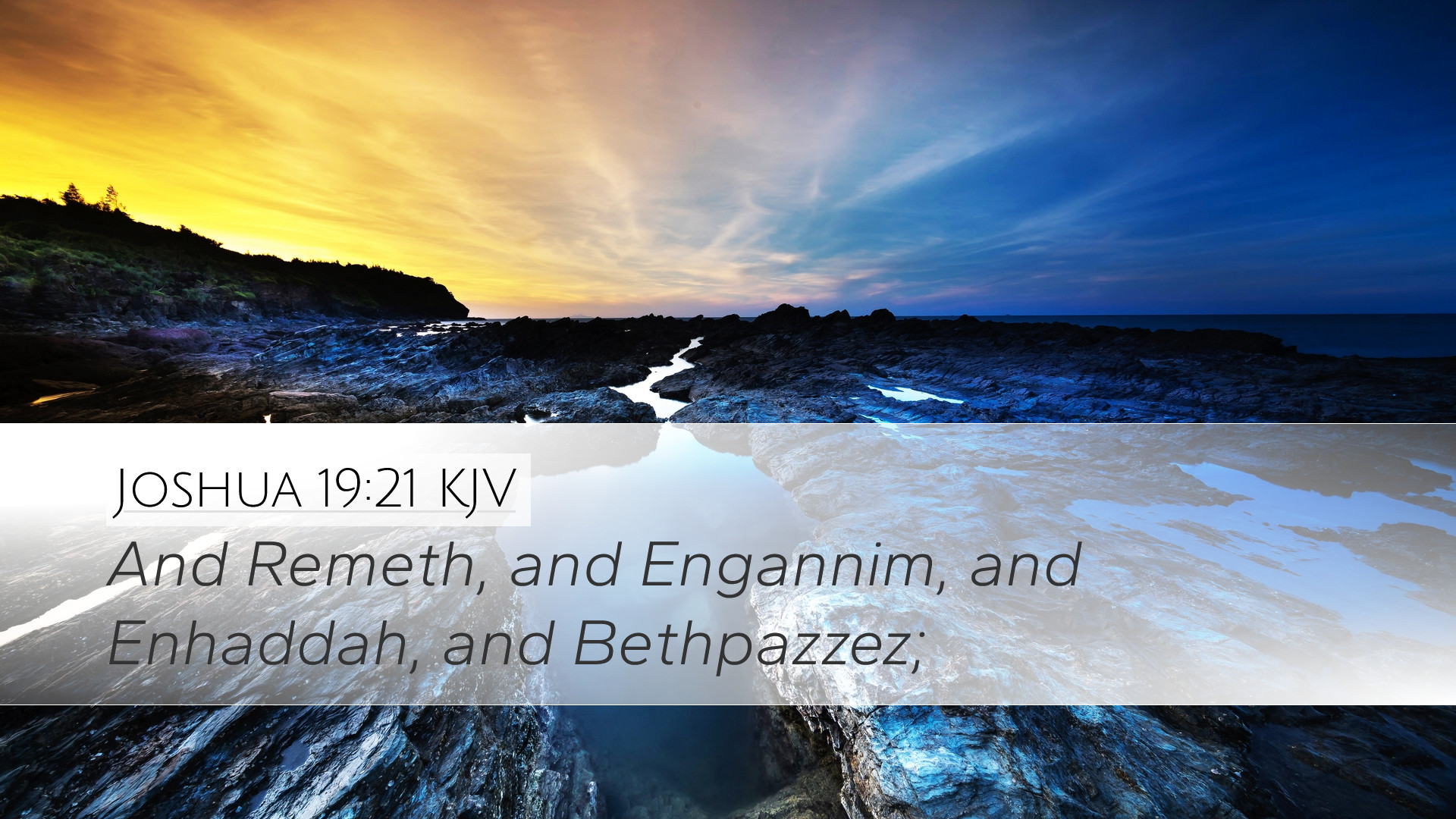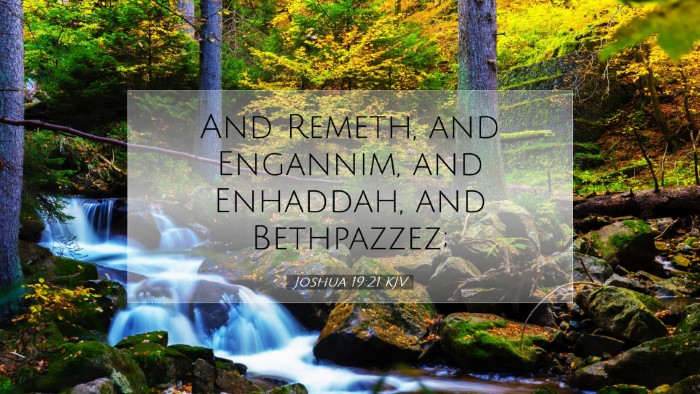Commentary on Joshua 19:21
Joshua 19:21 states: "And the rest of the children of Simeon were in the inheritance of the children of Judah." This verse highlights the significance of land distribution among the tribes of Israel and offers insights into the relationships and boundaries that defined their heritage and identity. In this commentary, we will explore the implications of this passage with insights from public domain commentaries.
Background Information
In the Book of Joshua, the allotment of land to the tribes of Israel is a crucial theme. After the conquest of Canaan, the Lord instructed Joshua to divide the land among the tribes. This act was essential not only for the settlement of the Israelites but also for fulfilling God's promise to their ancestors regarding the land.
Insights from Commentaries
Matthew Henry's Commentary
Matthew Henry highlights the importance of understanding the broader context of the tribe of Simeon’s inheritance. He emphasizes that the tribe of Simeon did not receive a separate territory but was incorporated within the borders of Judah. This integration illustrates the unity of the tribes and God's overarching plan for Israel:
- Unity in God’s Plan: Henry notes that while Simeon was less numerous, their inclusion in Judah’s territory emphasized the themes of community and cooperation among the tribes.
- Spiritual Implications: The blending of tribes may symbolize the necessity of humility and reliance on others within the body of Christ today. Henry suggests this reflects a principle in God’s governance where lesser or less prominent individuals contribute immeasurably to a collective goal.
Albert Barnes' Notes on the Old Testament
Albert Barnes brings forth additional perspectives on the implications of this inheritance, focusing on the historical and social context:
- Historical Significance: Barnes explains that the tribe of Simeon's numbers had diminished, and their lands were surrounded by Judah. This reality illustrates the fulfillment of God's promises, whereby the outcome for each tribe reflects their faithfulness and conduct in earlier history.
- Territorial Connections: The comment highlights that geographical boundaries were more than mere lines; they represented the covenant between God and His people. Each territory served as a reminder of God’s providence and the people’s spiritual obligations.
- Lessons on Differentiation: Barnes suggests that the lesson for believers applies broadly: even those who may appear less significant in the body of Christ have a vital purpose. Just as Simeon was subsumed under Judah, interdependence exists in Christian fellowship.
Adam Clarke's Commentary
Adam Clarke provides a critical examination of the social dynamics and practical implications of this distribution:
- Social Hierarchy: Clarke interprets the integration of Simeon within Judah not only as an act of land distribution but also as indicative of the underlying social structures. It displayed an arrangement where larger tribes supported smaller tribes, reflecting a hierarchy established within the Israelite confederation.
- Significance of Inheritance: Clarke notes that inheritance was sacred to the Israelites. By being assigned to Judah, the tribe of Simeon maintained a connection to a more prominent community, thereby ensuring their survival and prosperity.
- Sovereignty of God: He emphasizes that the division and merging of territories echo God’s sovereignty over the people. It reminds the reader that the divine plan involves ordaining relationships and territories in ways that serve His purposes.
Theological Reflection
This verse provides a rich ground for theological reflection on themes of:
- Community: The integration of tribes challenges modern notions of individualism. Believers are called to foster unity within diversity.
- Inheritance and Belonging: Much like the Israelite tribes, contemporary faith communities have an identity rooted in their collective inheritance. The merging of Simeon with Judah serves as a reminder of belonging amid the body of believers.
- God's Sovereignty: The distribution of land is a testament to God's control over human affairs. It urges readers to trust in His plans, even when circumstances appear limiting.
Conclusion
Joshua 19:21 encapsulates significant themes regarding the community, divine sovereignty, and the nature of spiritual inheritance. Through the insights offered by Matthew Henry, Albert Barnes, and Adam Clarke, readers are encouraged to consider the implications of communal identity and reliance on one another, harkening to the broader picture of God's providential care. The integration of the tribe of Simeon within Judah exemplifies the interconnectedness among God’s people, reminding us that each individual tribe—indeed, each believer—has a place and purpose within the greater narrative of God's kingdom.


